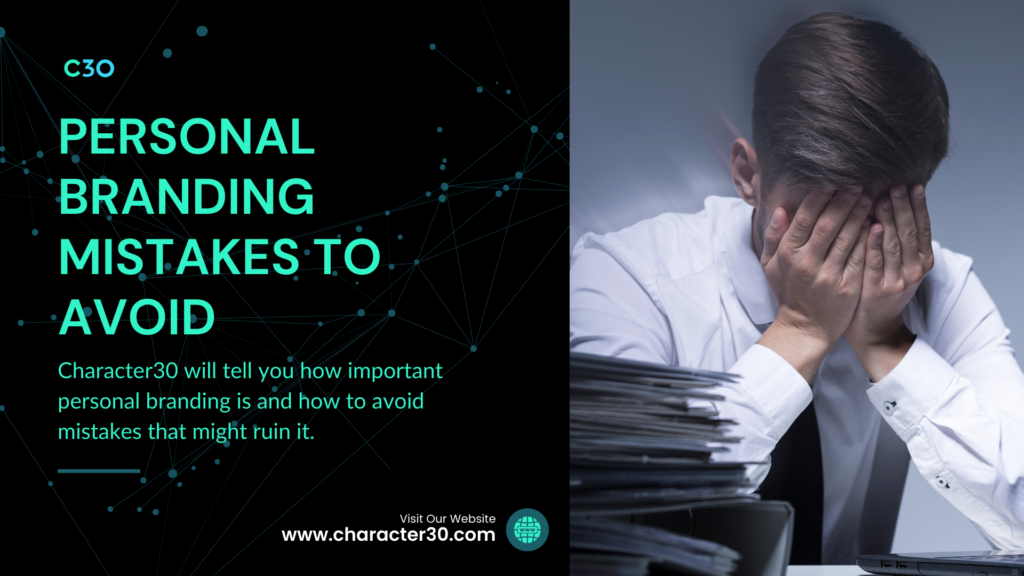
Personal branding is crucial for building a professional reputation and standing out in your industry. However, there are common pitfalls that can damage your personal brand. Avoiding these mistakes is essential to maintaining a strong and positive image. Here are some key personal branding mistakes to steer clear of and tips on how to avoid them.
2. Neglecting Your Online Presence
3. Overlooking The Importance of Networking
4. Ignoring Feedbacks and Criticism
6. Failing To Showcase Your Personality
7. Being Inconsistent with Your Values
8. Not Measuring Your Brand’s Impact
1. Lack of Consistency
Consistency is key in personal branding. Inconsistent messaging, tone, or visuals can confuse your audience and dilute your brand. Ensure your social media profiles, website, and any other online presence reflect the same values, tone, and style.
How to Avoid:
– Develop a brand style guide that includes your brand’s colors, fonts, and tone of voice.
– Regularly review your online presence to ensure consistency.
– Be mindful of the type of content you share and the way you interact online.
2. Neglecting Your Online Presence
Your online presence is often the first impression potential employers or clients have of you. Neglecting your online profiles can result in outdated or irrelevant information, which can harm your credibility.
How to Avoid:
– Regularly update your social media profiles and personal website.
– Share relevant and engaging content that reflects your expertise and interests.
– Ensure your online profiles are complete and professionally presented.
3. Overlooking the Importance of Networking
Building a personal brand isn’t just about self-promotion. It’s also about building relationships and engaging with your community. Overlooking networking opportunities can limit your reach and influence.
How to Avoid:
– Attend industry events, webinars, and conferences to connect with others in your field.
– Engage with your audience on social media by responding to comments and participating in discussions.
– Collaborate with other professionals and influencers to expand your network.
4. Ignoring Feedback and Criticism
Ignoring feedback or criticism can prevent you from growing and improving your personal brand. Constructive feedback is valuable for identifying areas of improvement.
How to Avoid:
– Be open to feedback and view it as an opportunity to grow.
– Actively seek feedback from colleagues, mentors, and your audience.
– Use criticism to make positive changes to your brand strategy.
5. Trying to Please Everyone
Trying to appeal to everyone can make your brand appear generic and uninteresting. A strong personal brand should target a specific audience and reflect your unique qualities and expertise.
How to Avoid:
– Define your target audience and focus your efforts on reaching them.
– Be authentic and true to your own values and interests.
– Don’t be afraid to share your unique perspective and voice.
6. Failing to Showcase Your Personality
Your personal brand should reflect who you are, not just what you do. Failing to showcase your personality can make your brand seem bland and unrelatable.
How to Avoid:
– Share personal stories and experiences that highlight your personality and values.
– Use a conversational tone in your content to make it more engaging.
– Highlight your passions and interests alongside your professional achievements.
7. Being Inconsistent with Your Values
Your personal brand should be a true reflection of your values and beliefs. Being inconsistent with your values can damage your credibility and trustworthiness.
How to Avoid:
– Clearly define your core values and ensure they are reflected in all your branding efforts.
– Stay true to your values, even if it means turning down opportunities that don’t align with them.
– Be transparent and honest in your communications.
8. Not Measuring Your Brand’s Impact
Without measuring the impact of your branding efforts, it’s hard to know what’s working and what’s not. Failing to track your brand’s performance can result in missed opportunities for improvement.
How to Avoid:
– Set clear goals and key performance indicators (KPIs) for your personal brand.
– Use analytics tools to track your online presence and engagement.
– Regularly review your performance and adjust your strategy as needed.
Conclusion
Building and maintaining a strong personal brand requires effort, consistency, and authenticity. By avoiding these common mistakes, you can ensure that your personal brand accurately




Leave a Reply